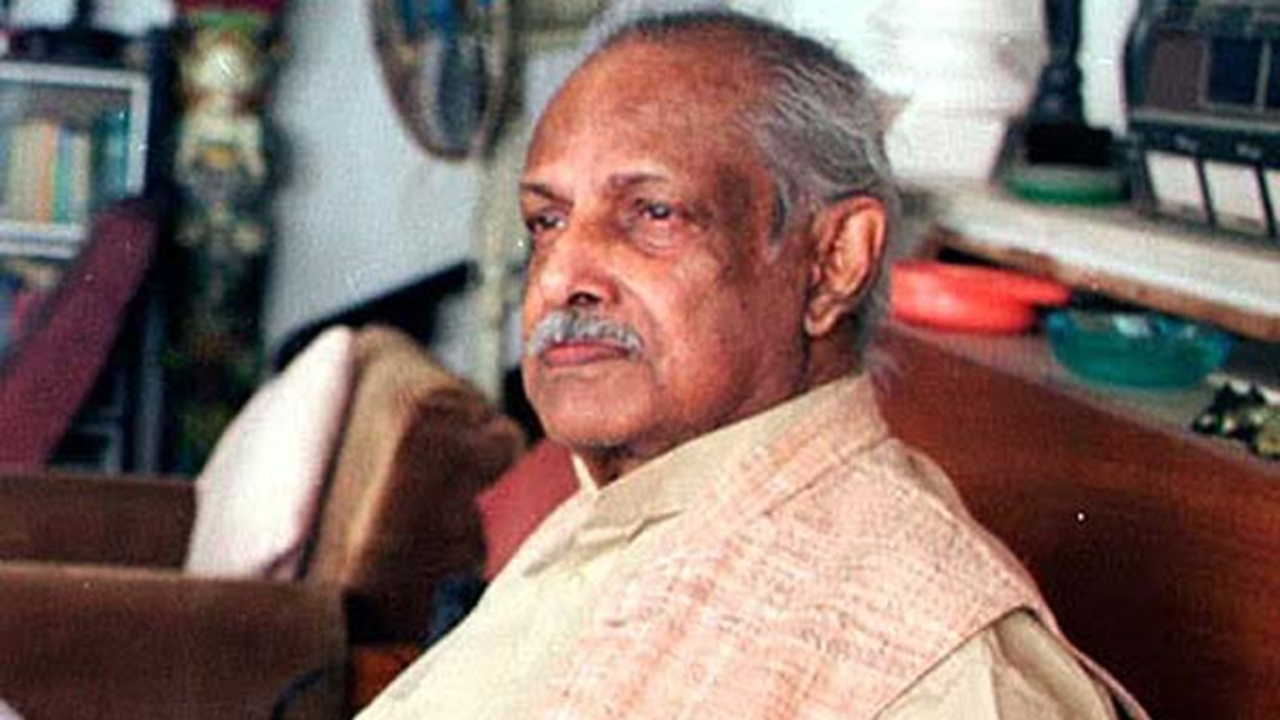
Hrishikesh Mukherjee Birth Anniversary: Revisiting Veteran Filmmaker’s Most Underrated Film Bemisal (Credits: Twitter)
Hrishikesh Mukherjee loved the Bachchan parivar and made some of his best films with them From the beautiful repertoire of films that Amitabh Bachchan did with Hrishikesh Mukherjee Bemisal (1982) stands out for giving the Big B one of his meatiest parts and perhaps the most nuanced interpretation of the Angry Young Man prototype.
Based on a Samresh Basu novel, Bemisal is the story of a curiously cynical do-gooder. The Big B plays Sudhir, a delinquent orphan taken in by a kind government officer(Om Shivpuri) who brings up Sudhir and his son Prashant (Vinod Mehra) as equals.
Later, much later, on his deathbed after a sudden heart attack, he tells his Bahu Kavita (Raakhee), “My son is weak. But whenever you’re in a crisis you can blindly depend on Sudhir.”
Prophetic words, those. As the exceptionally eventful plot moves forward we see how slyly Sudhir keeps stepping in to bail out his benefactor’s son. But here’s what makes Bemisal a unique and refreshing tale of sacrifice and self-annihilation. The sacrifices made by Sudhir are never apparent until much later when the passage of time shows the true enormity of how much Sudhir gives away to the friend whose father gave him back a childhood that would have otherwise been squandered on the streets.
There is a message on adoption in Bemisal. Om Shivpuri says, “I was advised, ‘Get a dog. Never bring a street child home.’ I didn’t listen to anyone. It was the best decision of my life.”
As played by Bachchan Sudhir emerges as a smirking enigma. Not just misunderstood by those who love him, but he also quite enjoys being perceived as being quite the opposite of what he is. The role of the closet martyr is done by Bachchan with exceeding intelligence and sensitivity. We are never allowed to feel sorry for this noble sacrificing soul. The Big B never glorifies his character’s generosity of spirit. He bleeds internally. He cries silent tears. He gives and he gives. Because that’s the only way he lives.
Most unique is the relationship that forms between Sudhir and his friend Prashant’s wife Kavita. He calls her ‘Sakhi’ throughout the film and flirts outrageously with her in front of her husband and even her father-in-law. He tells her his deepest secrets including those about his secret flings. Finally when he goes to jail and, in the film’s most memorable sequence, she comes to visit him in his favourite white saree with a red border, Sudhir lets Kavita, and us, have a peep into that fortified heart of his.
It’s a devastating moment, taken to heights of emotive glory by the Big B’s monologue. As he tells Kavita how much she means to him, and not just because she’s his friend’s wife, we see the wounds within his heart opening up and bleeding into the plot. We come away from the film wounded for life.
Tragically Bemisal is a far better film on paper than in execution. By the time Hrishida came to Bemisal, he had lost much of his gentle sensitive approach to his characters and their inner lives that we saw in all his films until Mili. The second half of Bemisal where Prashant falls into the lucrative trap of medical malpractice moves into too many tangents and subplots including an insane brother(Bachchan in a double role) who wants Sudhir to get even with the woman who destroyed him.
The wanton gold-digging woman (Sheetal) and her comeuppance are laboriously put across, almost as extraneous parentheses in a plot where the central relationship is not the one between the hero and his enemy or even his best friend, but the hero and the best friend’s wife.
‘Sakhi’ to the Big B makes the uniqueness of the relationship with Raakhee appear so natural and endearing you want to hold the relationship close to your heart. Hrishida is no stranger to the theme of asexual dosti between two people from different sections or communities. Amitabh Bachchan and Rajesh Khanna in Anand and Namak Haraam shared an uncommon friendship.
In Bemisal the bonding between the Big B and Raakhee crosses genders effortlessly, no thanks in large measures to the way the actor holds together the protagonist’s troubled inner world. Sudhir is a simmering ocean of discontent. People around him are welcome to mess with him at their own risk. Raakhee and the Big B bully and heckle one another, and impinge on each other’s private space without appearing intrusive. But they aren’t a couple.
Interestingly this was the second Amitabh Bachchan-Raakhee -Hrishikesh Mukherjee film where the hero doesn’t ‘get’ the heroine. In fact, no one gets him. He’s an enigma whose ways of working are a mystery perhaps even to God. In Jurmana three years before Bemisal, it was Vinod Mehra who was seen as worthy of the heroine. In both Jurmana and Bemisal, Big B played deeply flawed characters who in the end turn out to be far nobler than they seem.
Finally, it all comes together, though. Because it is, at the end of the Friday, an Amitabh Bachchan show. He could do wrong on screen. But his films never went wrong.
Bemisal Trivia
*The same novel was earlier adapted into a Bengali film titled Ami Se O Shakha. Uttam Kumar played the Bachchan’s part.
* Bemisal was dedicated to Uttam Kumar
* Sheetal who played the woman who destroys the hero’s brother’s life gave interviews about how she was the lead opposite the Big B. The motor-mouthed declarations were not appreciated by the film’s leading lady Raakhee.
*Hrishida made two back-to-back films Jurmana and Bemisal featuring the Bachchan-Raakhee-Vinod Mehra trio. Neither was a love triangle. Interestingly these were the only films where he worked with Raakhee. Otherwise, his favoured female leads were Sharmila Tagore, Jaya Bhaduri, and Rekha.
* Both Jurmana and Bemisal had memorable music by R D Burman. Lata Mangeshkar sang a haunting solo for Raakhee in both films. Sawan ke jhoole pade in Jurmana and Ae ri pawan in Bemisal are regarded among Lataji’s finest songs composed by Junior Burman.
*Master Mayur who played Junior Bachchan in any number of films, played the same part for the last time in Bemisal.
* If you look closely you can see a very young Anjan Shrivastava in one scene playing a walk-on part.
* After the film was over Big B continued to call Raakhee his ‘Sakhi’.
Amitabh Bachchan speaks exclusively to Zoom on Bemisaal
The 1982 film directed by Hrishikesh Mukherjee went largely unnoticed. But to my mind, Bemisal is one of your finest performances. Where do you place this film in your oeuvre, and among the very fine films you did with Hrishida?
I would challenge the comment that Bemisal as a film by Hrishi Da, went unnoticed. None of Hrishi Da’s films ever faced anonymity. Unfortunately, the gauge for being noticed has been perhaps equated with its commerce. Hrishida made films on limited and conservative budgets, and they had a return which although not earth-shattering, did attract a dedicated audience and a dedicated attractive commerce. I liked my character in Bemisal and found it most challenging, as challenging as my role in all his other films.
You played the double role of a silently giving underdog hero whose sacrifices are done so quietly no one knows about them, and then you also played the hero’s brother. How did you approach the two roles?
‘Beware the fury of a silent man’ is an adage I have often used in many of the challenging episodes in my life. I would like to presume Hrishida thought similarly when designing the character that I played. The motivation in its presentation was obviously the chaos it caused his twin look-alike brother emotionally and mentally, but when the fury erupted it more than squared everything up.
You, Raakhee, and Vinod Mehra had earlier got together for Hrishida’s Jurmana.Was there a camaraderie?
You question ‘camaraderie’ as though it is a function that should not exist when actors work together! Raakhee ji and I have worked in many many films together as too I had with Vinod Mehra – perhaps in fewer numbers – so yes, the spillover of amity in such conditions is always wonderful. But even if we hadn’t, I think all artists are professional enough to not allow personal traits and attitudes to creep in. At least that is how I look upon it.
What stands out in your performance in Bemisaal are the silences. How difficult was it to portray the troubled hero’s inner world through his silence?
My performances are guided by the director of the film I work in. If you have noticed something of value in my performance in Bemisal its credit must only go to Hrishida. Hrishida was a unique director. He would edit the entire film in his mind even before starting it. Many times we would question why he would make us do what he made us do. He would reprimand us for that, but when we would see the final results, there was nothing but embarrassed admiration in us for him!
Why do you think Bemisaal didn’t work at the box office?
As I said earlier, none of Hrishida’s films failed. It is wrong of you to think that ‘Bemisal’ was a failure, it was not. You were perhaps too young to have seen it when it got released. I feel it is most important to have lived in the times of the making and release of films, to give a justifiable opinion about them. But as a responsible journalist who has taken the trouble of perceiving Bemisal as a classic, it is a laudable gesture on your part – one that posterity shall honor!

